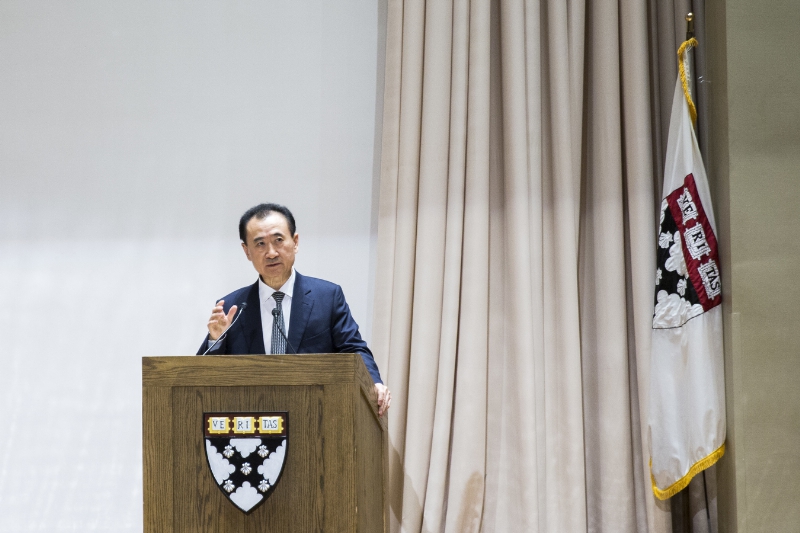Dalian Wanda Group chairman Wang Jianlin (a.k.a. China’s richest man) is perhaps the leading representative for the realization of the “Chinese Dream,” a vision of a revitalized national greatness that takes global soft power as a central theme. Yet even as Wang’s empire reaches around the globe, his words are being curtailed back home.
Last week, on October 29, Wang spoke at a widely promoted and well attended event at Harvard Business School on going global “the Wanda way. ” In his opening remarks, Wang outlined the four stages of Wanda’s development, from a regional residential property company to domestic real estate giant, and onwards to its future as a global cultural force focused on entertainment, sports, and tourism, with $15 billion in overseas investments to date, including the high-profile purchases of the AMC movie theater chain and Ironman event organizer World Triathlon Corporation.
Wang, known for being outspoken, encouraged his audience to ask him anything, citing Harvard’s well-known reputation for academic freedom. Moderator Willy Shih, a professor at Harvard Business School, raised an issue that was the subject of a New York Times article published in April—that Wanda’s rise has been aided by political connections, namely, investments in Wanda companies by relatives of China’s top leaders.
Wang replied with a level of detail unusual for discussions of such a sensitive topic, though he addressed only the holdings of Chinese President Xi Jinping’s sister and brother-in-law, with no mention of the investments in Wanda companies made by other family members of top leaders, such as the offspring of the former President Hu Jintao and former Prime Minister Wen Jiabao.
Willy Shih: So I’m going to ask another question which maybe a little bit controversial. You can decide whether you want to answer it. But I have a New York Times article from April 28, 2015, they suggest the reason behind Wanda’s rapid growth, as we herd earlier, you’re certainly growing very rapidly. But The New York Times suggests that the rapid growth relies on the company’s political affiliations. They even state that President Xi Jinping, and other leaders’ are relatives of President Xi Jinping, and other leaders are Wanda’s shareholders. Do you care to comment on that?
Wang Jianlin: Professor Shih, I can see you have an honest face, but I didn’t know you were so relentless. But you have asked, so I will answer you in front of your students. Firstly, Wanda has no political affiliation. In August 2009, our commercial properties subsidiary had initiated a round of private placement and appointed China Galaxy Securities and CICC, China’s largest at the time, to oversee its execution. we set a relatively high price at RMB13 per share. We successfully raised RMB4 billion, breaking the record for the most capital raised by a Chinese private company at the time. Chairman Xi’s brother-in law, Mr Deng Jia Gui’s investment company, Qin Chuan Dadi, participated in the private placement at the same subscribed price level as other investment companies, such as the investment company of China Construction Bank and China Fan Hai Development. Just two months before the listing, Mr Deng sold all the shares held by his investment company and fully exited at a low price point, and I’d like to state at this point that Mr Deng was never a shareholder of our listed company. After six years of investment, he sacrificed the opportunity to realize a huge return in investment. This incident demonstrates that President Xi is not only strict in managing our country but is even more scrupulous when it comes to family affairs.
We owe our rapid growth to our core competence of innovative business model and effective management practices. We pride ourselves on our unparalleled, industry-leading execution capabilities, and it is not easy to find another organization such as Wanda that is capable of completing the construction of commercial centers and hotels in such a consistent and punctual fashion. Some of you may not be familiar with cases studies relating to China, so I will give you an example in the U.S.: AMC. After years of recorded losses we turned it around to make a profit in its first year post-acquisition, and got it listed on the NYSE in the second year with substantial returns to shareholders. This goes to show that the success of our rapid development rests squarely on the shoulders of our core competencies.
The above remarks were translated and promptly circulated by Wanda’s public relations team as Wang’s “first ever response since the publication of the [New York Times] article,” and both Chinese and overseas media were quick to report on the comments. Around the same time, a full video of Wang speaking at Harvard was posted on the website of the Fairbank Center for Chinese Studies at Harvard, which had sponsored the event, and Wanda also published a full English transcript on the company site under the headline, “Wang Jianlin Delivers Open Lecture at Harvard Business School.”
Yet apparently the openness surrounding Wang’s talk struck a note of dischord somewhere in China. Feichangdao.com, a website that covers Chinese media censorship, noted that domestic search engines and social media sites were quick to begin censoring results for Wang’s speech, and at least one news report on his comments was removed within hours of being posted. Wanda subsequently edited its transcript of the speech to remove Shih’s question and Wang’s reply on the issue of investments by relatives of high-ranking leaders, though a review of Google’s cached version of the transcript shows that no other significant parts of the speech were deleted. Harvard’s video of the event, which previously had featured audio of the simultaneous interpretation, was also briefly unavailable on Thursday, though it subsequently was reposted without the English-language voiceover. A Fairbanks Center spokesperson said that the video had been removed at the request of the translators while subtitles and an English translation were being prepared.






